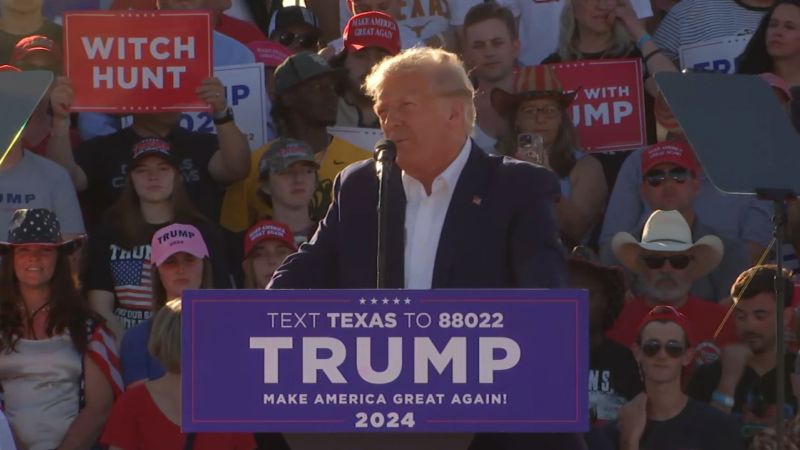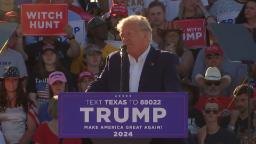

CNN
—
More than a week ago, former President Donald Trump predicted – incorrectly – that he would be arrested in a New York criminal case.
His statement led to a flurry of speculation on the state of the Manhattan grand jury investigating Trump’s alleged role in a scheme to pay hush money to adult film star Stormy Daniels before the 2016 election.
But no action has come from the district attorney’s office thus far, and the grand jury is not expected to consider the Trump case again this week, two court sources familiar with proceedings told CNN. The grand jury will not meet Wednesday and will be hearing an unrelated case on Thursday, the sources said. The grand jury typically does not meet on Fridays.
Grand jury proceedings are secret and the jury could always be called back in by prosecutors.
Here’s where things stand in the investigation and what questions are still looming:
No. Trump posted on his social media to predict he would be arrested last Tuesday, along with a call for his supporters to protest that echoed his comments after he lost the 2020 election in the lead-up to January 6.
Trump’s comments were possibly based on reporting about security preparations being made by law enforcement in New York in the event of an indictment.
He’s continued to rail against Manhattan District Attorney Alvin Bragg and the other prosecutors investigating him in Washington, DC, and Georgia. He warned last week that his arrest would lead to “potential death & destruction” and “could be catastrophic for our Country.”
“The new weapon being used by out of control, unhinged Democrats to cheat on elections is criminally investigating a candidate,” Trump said at a rally in Waco, Texas, on Saturday.
The grand jury is not expected to meet on the hush money case for the rest of the week, meaning next week is the earliest the panel could be asked to take a vote on whether to indict the former president.
NBC News first reported the grand jury would not meet again on the Trump case this week.
Bragg is investigating Trump over the reimbursement of a $130,000 payment Trump’s former lawyer and fixer, Michael Cohen, made to Stormy Daniels before the 2016 election for her silence about an alleged affair with Trump a decade earlier. Trump has denied the affair.
Prosecutors do not have a hard deadline in the short term to conclude their case, as the grand jury sits until June.
Last week, the district attorney’s investigation appeared to be nearing an end following testimony on March 20 from Robert Costello, who testified on Trump’s behalf to try to undercut Cohen, the prosecution’s key witness.
But CNN and others reported last week that Bragg was still considering calling in at least one more witness before wrapping up the investigation.
On Monday afternoon, former National Enquirer publisher David Pecker was whisked into and out of the Manhattan courthouse building. He was a central player in the hush money payment scheme, helping to negotiate the payment as then-chairman of American Media Inc. AMI has signed a non-prosecution agreement with prosecutors.
Pecker’s testimony suggests the district attorney’s office may have felt the need to rebut the testimony of Costello, who claimed Cohen had made the payment to Daniels on his own.
It’s not clear yet whether any more witnesses will be called as the proceedings are behind closed doors.
In order to indict Trump, a majority of the grand jury has to agree with prosecutors to bring a case against Trump. In a grand jury, the standard of proof is lower than a trial jury, and the decision does not need to be unanimous.
If Trump is indicted, the charges are expected to be filed under seal. Trump’s attorneys would then likely be notified and preparations would be made for Trump to travel to New York to surrender and hear the charges.
It would be an historic indictment: No current or former president has ever been charged with a crime.
There have been security preparations underway for several weeks now among multiple law enforcement agencies about how security for a potential Trump indictment would be handled in Manhattan.
It’s still not clear how the public might learn about the charges – the district attorney could announce them, or perhaps Trump would get word out first through his social media if he’s been notified that he will be indicted.
What Bragg has made clear is that the public will know what happens: he’s pledged to publicly state whether or not Trump is going to be charged once the investigation has concluded.
They are still ongoing – and could lead to additional legal troubles for Trump.
A federal judge recently ordered former Vice President Mike Pence to testify to a grand jury about conversations he had with Trump leading up to January 6, 2021, as part of special counsel Jack Smith’s investigation into January 6.
But the judge said – in a ruling that remains under seal – that Pence can still decline to answer questions related to his actions on January 6 itself, when he was serving as president of the Senate for the certification of the 2020 presidential election.
Still, the ruling is a major win for Smith, and the latest in a string of legal victories for the special counsel seeking to obtain testimony from Trump’s current and former aides.
Last week, Trump’s primary defense attorney Evan Corcoran appeared before a federal grand jury, where he was expected to answer questions in Smith’s investigation into the handling of classified documents at Mar-a-Lago, after Trump unsuccessfully fought to keep him from testifying.
In addition to the special counsel’s pair of investigations, a special grand jury in Fulton County, Georgia, wrapped up an investigation into efforts to overturn the 2020 election earlier this year. Fulton County District Attorney Fani Willis has suggested indictments could be coming in that case as soon as this spring.
This story has been updated with additional details.
